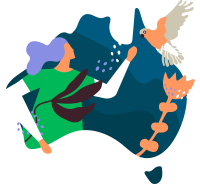CEO Update from Mental Health Australia: Why climate action in Australia matters for mental health
22 October 2021

With the Glasgow Climate Change Conference set to begin next week, it’s great to see climate change action is high on the global, and national agenda.
Over the last 130 years, the planet has become approximately 0.85°C warmer. The level of carbon dioxide and other greenhouse gasses emitted through human activity since the start of the Industrial Era has led to heat becoming trapped in the lower atmosphere.
Human activity has affected the global climate, leading to significant health — including mental health — impacts.
Our position statement on climate change calls attention to a number of ways climate impacts mental health.
More extreme weather events and natural disasters can have a psychological toll in stress and anxiety. As our member organisation, SANE explores in its Life After Bushfires resources, bushfires can be traumatic and can lead to a range of distressing experiences. They may also exacerbate existing symptoms of mental ill-health.
While we’ve spoken throughout the last eighteen months about the mental health toll of the pandemic, research shows Australians are three times more worried about climate change than they are about COVID-19. We have been warned: we’re at risk of widespread “eco-anxiety, climate disaster-related post traumatic stress disorder (PTSD), and future-orientated despair.”
The impacts of climate change will not be uniformly felt. Rather, it will exacerbate social and economic inequalities that already exist. Those in rural and remote areas will be more likely to face the stress and trauma of drought and bushfires. People with existing illnesses may find that heatwaves disproportionately affect their health and mental health.
As the Australian Council of Social Service writes, climate change is a particular challenge for the community services sector. Smaller and medium-sized organisations are more likely to struggle from losses resulting from extreme weather events. Half may not recover at all. At the same time, those organisations that provide services to disadvantaged people are more likely to be needed in the face of these extreme events.
Climate change is predicted to cause immense cultural loss. One example was explored by an episode of ABC’s 7.30 earlier this year, where rising sea levels are shown to already be threatening the homes of Torres Strait islanders. As Yessie Mosby commented for the program:
This whole island, Masig, is our library. It has knowledge. It has history. It has ancestral connection which ties us back to this land. Masig is our maternity ward. This Masig is our hospital. This island is our supermarket. It provides us with our food. It feeds us. It gives us shelter.
Losing such deep, enduring connections is likely to lead to trauma of an incomprehensible scale. We have witnessed this ourselves in Australia through the stories of transgenerational traumatic impact for Aboriginal and Torres Strait Islander communities of being disenfranchised and forcibly disconnected from their land.
As our Mental Health Australia position statement points out though, there is hope:
The mental health sector witnesses time and again the deep resilience, adaptability, strength, and practical optimism of human beings in the face of overwhelming personal and collective challenges. We can and must bring all of these resources to bear to in addressing the health threats of climate change.
In May this year, we were also proud to sign the health sector's Open Letter to the Prime Minister to reduce emissions and save lives.
And we know that caring for the environment has mental health benefits. Sunlight, green space, and opportunities to explore and be active in the world can lead to greater well-being.
There are many ways we can get involved in environmental activities, such as joining citizen science initiatives, environmental clean-up events, community garden projects, and more. For example, this week we met with Alison Hill who has some well-developed ideas to link people and parks for the benefit of their well-being.
We can do this as we campaign for wider systemic change, more ambitious targets, and a sectoral-wide endorsement of climate action.
Have a good weekend, and enjoy this beautiful environment which we must to protect

Dr Leanne Beagley
CEO
Federal Government urged to tackle mental health and wellbeing crisis by investing in social prescribing
The Royal Australian College of General Practitioners (RACGP), Consumer Health Forum of Australia (CHF) and Mental Health Australia are urging the government to implement a national social prescribing scheme to tackle Australia’s mental health and wellbeing crisis in the 2021 Mid-Year Economic and Fiscal Outlook (MYEFO). Read more.
Congratulations to TheMHS Awards Winners
People from all parts of mental health services have been recognised for their vital contributions to addressing mental health issues across Australia and New Zealand, in the TheMHS Mental Health Service Awards. Mental Health Australia would like to join TheMHS in recognition of the following individuals, organisations, and projects:
Education, Training or Workforce Development Award: e-Mental Health in Practice, for its programme, eMHPrac – providing training and support to health practitioners in using digital mental health.
Lived Experience Leadership Award: Lived Experience Australia for its programme, Making a difference with and for consumers and carers.
Mental Health Promotion or Mental Illness Prevention Award: The Matilda Centre, University Of Sydney for Climate Schools: Internet-based health and wellbeing programs for secondary school students.
Mental Health Promotion or Mental Illness Prevention Award: Arts Centre Melbourne, for The Arts Wellbeing Collective.
Psychosocial and Support Award: ACT Recovery College for ACT Recovery College Trial.
Therapeutic and Clinical Services Award: Tū Ora Compass Health for Piki: Empowering and supporting rangatahi towards better health and wellbeing.
Therapeutic and Clinical Services Award: Orygen Digital for Moderated Online Social Therapy (MOST): digitally enhancing youth mental health services.
General Award: Kapiti Youth Support, for The KYS Approach.
Early Career Research Award: Stephen Parker, for his work, “Understanding community-based residential mental health rehabilitation services in Australia”.
Early Career Research Award: Katrina Prior, for her work, “‘Inroads’ and ‘Re-Train Your Brain’: Innovative internet-delivered interventions for young people who drink to cope with anxiety”.
Sound and Vision Journalism Award: Sam Ikin with Butterfly Foundation, for Butterfly: Let’s Talk podcast.
Text and Online Journalism Award: Bridget Judd, for her article, “It takes a village”.
Exceptional Contribution Award: Fran Silvestri in recognition of a highly skilled and creative collaborator, becoming a crucial connector within the mental health community and bringing significant contribution to leadership within the mental health sector locally, nationally and globally.
Wellbeing in the Workplace Category: Air New Zealand for Air New Zealand Mental Health and Wellbeing Programme.

October is Mental Health Month
You can still make a #MentalHealthPromise via the Look after your mental health, Australia website. And catch up on some great video tips our partners, comedians, athletes, and others have made for looking after your mental health.
 Happiness on the horizon: mental health and wellbeing of healthcare professionals revealed
Happiness on the horizon: mental health and wellbeing of healthcare professionals revealed
New research from Mental Health Australia has revealed how healthcare professionals have been faring on the frontline, and how support from family and friends remains crucial to their wellbeing. According to the research results, 74% of healthcare professionals said restrictions resulting from COVID-19 outbreaks have had a negative impact on their mental health and wellbeing. Of the respondents, 86% said that working in healthcare during the COVID-19 pandemic has increased the amount of stress and pressure they experience in the workplace. However, the majority (58%) said they were feeling more positive about the future and felt they were better able to cope now, compared to working under pandemic conditions last year. Read more.
 Jam Pakt — Indigenous Radio Program a highlight this Mental Health Month
Jam Pakt — Indigenous Radio Program a highlight this Mental Health Month
Jam Pakt is a one-hour entertainment-driven radio program designed specifically for Indigenous audiences across the country, delivered to a network of 269 Indigenous markets/stations across Australia. The show during Mental Health Month was dedicated to promoting World Mental Health Day and the idea of Looking Up, Looking Out for each other and Looking Forward to #LookAfterYourMentalHealthAustralia and featured The Hon Ken Wyatt MP, Troy Cassar Daley, Shari Sebbens, Shellie Morris, Joe Williams, Hunter Page-Lochard, Dr Clinton Schultz, and more. Catch up with Jonzy and the mob here.
|
|
|
|
|
CALD Mental Health Consumer and Carer Group: recruiting now!The Embrace Project is looking for participants from across Australia who are passionate about multicultural mental health and ready to contribute to the next phase of the project to achieve real change.
Group Members may be eligible for the payment of sitting fees and all travel and accommodation expenses associated with meeting attendance, will be paid for. Memberships are limited, and to be considered, either complete the online form or download the expression of interest form available here and submit by 11.45pm AEST 7 November 2021. Successful candidates will be requested to attend the next virtual meeting in early December. The 2021 Australian Rural & Remote Mental Health SymposiumThe 2021 Australian Rural & Remote Mental Health Symposium will be held online from 3-5 and 8 November. Leanne Beagley will be a keynote speaker on Workforce challenges in rural and remote mental health and the place of systemic solutions. Additionally the Embrace Project Manager Ruth Das has been a Committee member for the symposium will present a paper on ways to ensure rural and remote mental health services are relevant to people from CALD backgrounds, and chair a number of sessions.
|
|
|
|
|
|
|
|
|

